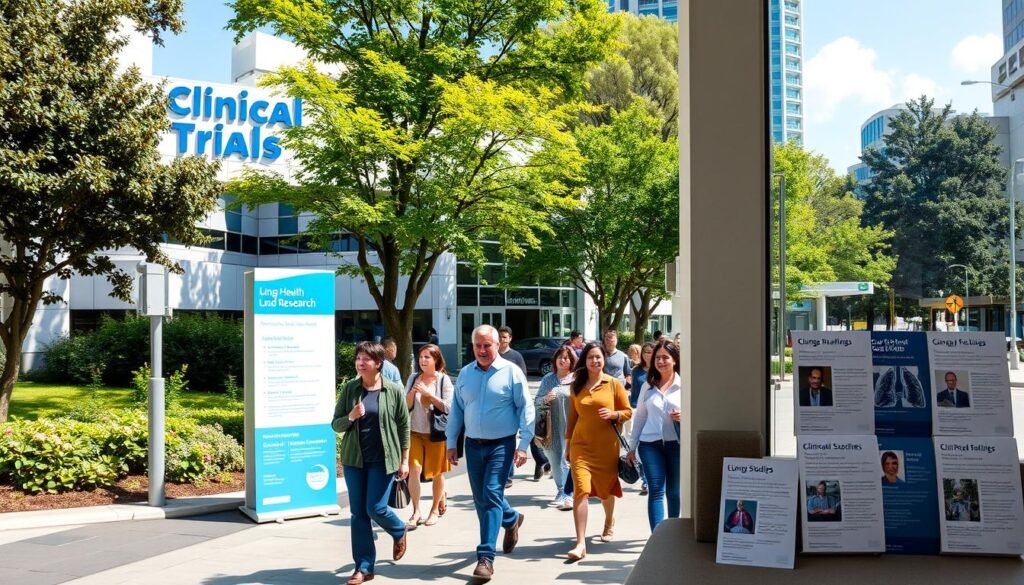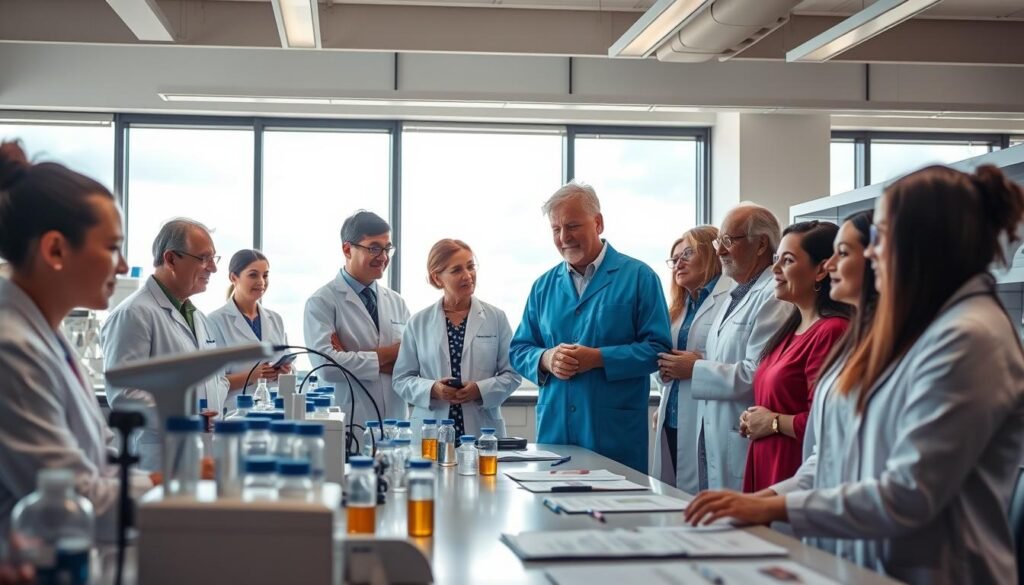Did you know that today’s drugs and procedures were tested in clinical trials? For those with non-small cell lung cancer (NSCLC), joining these studies is key. They offer access to new therapies and a chance to help future patients. Clinical trials test new treatments and methods, such as novel medication delivery and surgical techniques. This article will show you how to join NSCLC clinical trials. By participating, you help develop better treatments for everyone.
Key Takeaways
- Clinical trials test new medications and treatment methods for lung cancer.
- Patients often receive enhanced care and support during clinical trials.
- Participation in trials can lead to early access to effective new treatments.
- Insurance typically covers standard treatment costs, with additional costs often covered by the trial.
- Participants have the right to withdraw from a trial at any time.
- Clinical trials can empower patients and their families, giving them an active role in cancer research.
- Many innovative lung cancer therapies stem from successful clinical trials.
Understanding Clinical Trials for Non-Small Cell Lung Cancer
For those with Non-Small Cell Lung Cancer (NSCLC), knowing about clinical trials is key. These trials test new treatments, ways to diagnose, and how to prevent lung cancer. Since NSCLC makes up about 80-85% of lung cancers, these trials are crucial for better care.
New treatments like immunotherapy are being studied in NSCLC trials. Drugs such as Atezolizumab and Pembrolizumab are now approved for use after surgery and chemotherapy in early-stage patients. These treatments help the immune system fight cancer cells, which can lead to longer survival.
Recent studies have shown big leaps in how NSCLC is treated. For example, patients with certain gene mutations have benefited from Dabrafenib and Trametinib therapies. Also, identifying biomarkers with Next-Generation Sequencing (NGS) helps create tailored treatment plans and finds who can join clinical trials.
Patients can join ongoing studies to try to improve their outcomes. Trials like the Pragmatica-Lung Study and ALCHEMIST are looking into new treatment paths. Joining these trials helps not just the patients themselves but everyone by adding to our knowledge of NSCLC.
What Are the Types of Clinical Trials?
Clinical trials are key to improving patient care and advancing medical knowledge. There are different types of clinical trials, each testing new treatments in its way. For NSCLC, these trials usually include:
- Phase 0 Trials: These use very small doses in a few people to study how the drug works and how cancer cells react.
- Phase I Trials: These trials aim to find the safest dose of a new treatment with a small group. They focus on safety, but some may still see benefits.
- Phase II Trials: After Phase I, these trials test if the treatment works well in 25 to 100 patients with the same cancer.
- Phase III Trials: These compare new treatments with the best current options in many patients. They check if the new treatments are better or the same.
Each trial type helps us learn more about experimental lung cancer treatments. Through these trials, researchers can see how new drug combinations affect patient outcomes.
| Type of Trial | Objective | Participants |
|---|---|---|
| Phase 0 | Preliminary assessment of drug interactions | Very small group |
| Phase I | Determine safe dosage | Up to a few dozen |
| Phase II | Assess treatment efficacy | 25 to 100 patients |
| Phase III | Compare new and standard treatments | Hundreds to thousands |
This structured approach is crucial for advancing healthcare. It allows the evaluation of new lung cancer treatments over time.
Key Benefits of Participating in NSCLC Clinical Trials
Signing up for NSCLC clinical trials offers several key advantages. Patients get early access to treatments not yet public. This lets them use new medical breakthroughs immediately.
Moreover, participants get closer care and supervision from medical experts. This special attention improves the management of their health and cancer.
Being part of these trials aids scientific progress, shaping future cancer treatments. Sadly, fewer than 5% of adult cancer patients join trials. Yet, there’s a high interest among Americans. Their participation doesn’t just help them. It helps advance treatments for others too.
If you’re considering trial options, talk to your healthcare provider. Learning more about the advantages of NSCLC clinical studies is crucial for an informed choice.
How to Get Involved in Clinical Trials for New NSCLC Therapies
Joining clinical trials provides vital chances for patients. They seek new ways to battle non-small cell lung cancer (NSCLC). By talking deeply with healthcare pros, the journey kicks off. Oncologists share knowledge on entering clinical trials for new NSCLC treatments. They consider each patient’s unique situation. It’s all about knowing what’s out there and seeing if it fits you.
Identifying Suitable Trials for Your Condition
Patients looking for NSCLC trials can turn to several spots. Notable ones are ClinicalTrials.gov and the National Cancer Institute’s (NCI) website. These places list sanctioned trials happening everywhere. Handy details they offer include:
- Trial objectives: They tell you what the trial aims to achieve.
- Treatment details: You learn about the therapies under test.
- Location: They show where the trials take place.
NCI-Designated Cancer Centers keep fresh lists of ongoing clinical studies. Biotech firms also share their own trials online. This lets patients find studies that fit their health needs well.
Discussing Options with Your Healthcare Team
Talking with healthcare pros is key in this process. Patients should reach out to trial coordinators for in-depth study info. Knowing the details, who can join, and if they can get there helps in making wise choices. It’s worth noting that under 5% of adult cancer patients join these trials. So, every chance to participate is precious.
Seeking extra help from cancer advocacy groups is good. They offer up-to-date research news and ways to take part. Patients eager to help shape the future of NSCLC treatments should definitely connect. Finding out how to help brings hope to many.

Eligibility Criteria for NSCLC Trials
It’s key to know what NSCLC trials require from their participants. Each trial looks for people who meet specific conditions. This may include the cancer’s type and stage, past treatments, and general health. Getting to know these criteria can boost one’s chance of getting into a trial.
Common Requirements for Participation
Many trials share similar common requirements for participation. These usually involve:
- Having a diagnosis of non-small cell lung cancer (NSCLC).
- The cancer’s stage, confirmed by a doctor.
- What treatments you’ve had in the past. Some studies ask for specific ones.
- Good physical health that fits the study’s needs.
- In some cases, age and gender matter too.
For a deep look at treatment options like surgery and immunotherapy, check out this resource.
Importance of Medical History in Trials
A correct health record is crucial for NSCLC trial entry. Doctors often need to know:
- Past diagnoses.
- All treatments tried, and how well they worked.
- Other health issues that might affect joining a study.
This helps to match the trial with the right participants. It’s how trials stay on track and show how treatments perform for different people.
Finding Open NSCLC Clinical Trials Near Me
Anyone looking for non-small cell lung cancer (NSCLC) trials has more options today. Finding them is easier than before. Patients can find studies near their homes or with their doctors. Online tools help with this search.
Utilizing Online Resources and Databases
Online sites like the American Lung Association and ClinicalTrials.gov list many current trials. By using these sites, patients can search trials that match their condition. The National Cancer Institute offers a search tool too, available by calling 1-800-4-CANCER. Additionally, CISCRP gives tools to help find nearby studies easily.
Contacting Local Cancer Centers and Hospitals
Local cancer centers and hospitals keep lists of active studies. Patients should talk directly to these places for detailed trial info. This step can show local study options and explain how to join them. It also means getting help based on what each patient needs.

Potential Risks of Experimental NSCLC Therapies
Joining clinical trials can offer big chances for patients. However, it’s key to know the risks of experimental NSCLC therapies. These treatments may have unexpected side effects. Some patients might get a placebo instead of actual treatment. Knowing about placebos is key for making good choices about joining trials.
Understanding Placebo Treatments
In clinical trials, a placebo is used to check new therapies’ effectiveness. It acts as a comparison for the real treatments being tested. Knowing about placebos is important because some participants won’t get real treatment. This helps everyone be clear and make informed choices.
Balancing Risks and Benefits
Talking with doctors is crucial before joining a trial. They’ll help you understand the risks. Experimental drugs can have a range of side effects, from mild to severe. Some trials test new medicines, others look at new surgeries or radiation. Weighing these risks against benefits is necessary. Benefits include getting the newest treatments and close health monitoring. For more details, visit this link.
| Trial Phase | Typical Participants | Focus |
|---|---|---|
| Phase I | 10 to 30 | Testing safety and dosage |
| Phase II | Hundreds | Determining effectiveness |
| Phase III | Thousands | Comparing with standard care |
Participating in Lung Cancer Drug Development
Getting involved in lung cancer drug development is key to making new treatments. People in NSCLC clinical trials give important insights. These help test new therapies. Their efforts make us understand lung cancer better. They can greatly impact future treatments too.
The Role of Participants in Research Advancement
Volunteers in clinical trials are crucial for drug development. They provide vital data for lung cancer therapy breakthroughs. From 2005 to 2023, China started over 1,357 NSCLC trials. The highest was 199 trials in 2021. This shows a strong will to fight this tough disease.
Their active role helps create new treatment options. They’re key in moving drug discovery forward. This is true in different trial phases where various treatments are tested.
How Participation Influences Future Treatments
Clinical trials shape future treatment and patient care. About 48.19% of trials look at combined drugs. This shows how vital participants’ views are in finding better treatments. Drug approvals often rely on improving survival rates. This depends on data from these trials.
By joining in research, participants help with current and future lung cancer care. This ongoing process of testing and improving shapes future treatments. It helps patients outside these trials too.

| Clinical Trial Phase | Number of Trials | Percentage |
|---|---|---|
| Phase I | 140 | 10.32% |
| Phase II | 462 | 34.05% |
| Phase III | 333 | 24.54% |
| Phase IV | 139 | 10.24% |
| Observational Studies | 157 | 11.57% |
Most trials focus on Phase II. This shows a big effort in finding good treatments. It highlights how crucial participants are. They are the core of research for new lung cancer treatments.
Support and Resources for Trial Participants
People looking into clinical trials need support and info to deal with the complex stuff. Knowing about support for trial participants and insurance coverage for clinical trials really helps.
Understanding Insurance Coverage for Clinical Trials
Joining clinical trials usually doesn’t make healthcare costs go up. Most of the time, insurance pays for the regular tests and treatments needed during the trial. But since insurance plans differ, it’s key to talk to your insurer before starting a trial.
Accessing Help from Cancer Advocacy Groups
Cancer advocacy groups are crucial for people in clinical trials. They provide:
- Educational webinars on getting into lung cancer clinical trials.
- Connections with lung cancer survivors who can talk about their trial experiences.
- Advice on how to go through the clinical trial process, including how to meet eligibility requirements.
For extra help, places like ClinicalTrials.gov and the National Cancer Institute have lots of info on trials. The Lung Cancer Support Line also offers direct support at (844) 835-4325.
| Resource Type | Description | Contact Information |
|---|---|---|
| Cancer Hope Network | Connects patients with survivors for shared experiences | Available online |
| Lung Cancer Support Line | Support and resources for patients | (844) 835-4325 |
| Educational Webinars | Webinars with patient experiences and trial information | Check local listings |
| ClinicalTrials.gov | Comprehensive database of clinical trials | Visit the website |
Conclusion
Joining clinical trials for NSCLC offers patients a unique chance. They can help with important cancer research and might get new treatments that improve their health. Since lung cancer is the top cancer worldwide, with NSCLC making up most cases, we need more research.
Lung cancer patients can find different options that match their health needs by joining these studies. To choose wisely about NSCLC research studies, people should work closely with their doctors. Knowing what each trial is about can help patients find the best ones for them. Using extra resources also makes it easier to find helpful trials.
The way we treat NSCLC is constantly getting better, thanks to patients in clinical trials. They don’t just help make treatment better for others in the future. They also help bring about new discoveries that could save lives.